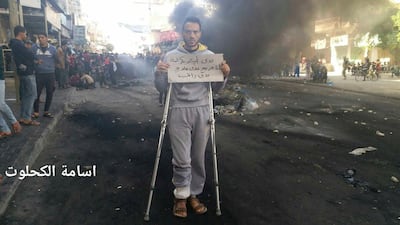Hopes of change in Gaza are fading fast as the Hamas crackdown on a mass protest movement this week is already seeing dwindling numbers of people turning out.
A local Palestinian human rights watchdog has recorded over 1,000 arrests in the past week, 300 of those are still in detention.
Those released from Hamas custody were forced to pay a fine of around $280 and sign a document pledging not to participate in further demonstrations or face a fine of $2,800, the Independent Commission for Human Rights (ICHR) added. In the Hamas response, director ICHR Jamil Sarhan was hospitalised.
Many of those released said that they were beaten and tortured while in prison.
Mass protests against Hamas' rule in the poverty-stricken strip are rare despite the dire situation brought about by poor local management and the Israeli blockade.
But this week, thousands have been marching across the strip to call on Hamas to reduce prices, ease taxes and improve management. The demands fell short of calling for Hamas to step down from power.
In the demonstrations, protesters lifted signs that reads: "we want to live the same life of luxury, money and cars as Hamas' leaders' sons."
United Nations envoy Nickolay Mladenov on Sunday condemned a "campaign of arrests and violence" by Hamas security forces.
The Palestinian faction has run the enclave since it won an election in 2006 and expelled many Fatah officials and leaders in the split that followed. Having endured three wars between Hamas and Israel since 2008, much of the strip’s infrastructure is shattered.
Youth unemployment is at 70 per cent, the World Bank reports, and the Israeli blockade that has sealed the borders is largely to blame. Rights groups have said it represents a policy of collective punishment.
Suffering financial shortfalls, Hamas has ratcheted up taxes on cigarettes and other goods. The tomatoes – among many staples – have tripled in price in recent months.
The march, dubbed the “we want to live” demonstrations, were met from day one by Hamas security officials who used force to quell the dissent.
Protesters were beaten with batons, gunmen fired in the air and hundreds of activists and demonstrators were rounded up and arrested.
"There's no hope of any progress in Gaza as long as Hamas is in power," Issam Saeed, who participated in the protests, told The National. "However, I cannot take part any more, I cannot go through this experience once again. Subjecting my family to raids in which my mother was beaten and our furniture was destroyed, and later being tortured and imprisoned in a 6 by 4 [foot] room with a hundred people for days."
One of the founders of the "we want to live" movement, told The National, how they had been cautious in their demands to try and avoid a draconian response. "We intentionally didn't call for Hamas' ousting because we knew that this is an impossible task. Instead, we settled for reasonable demands of reducing taxes, reducing prices of goods, etc. But not only did Hamas not even try to comply with the people's simple demands but it also devastated the protesters."
He said that even though the call was simple enough for Hamas to head, the party “was calculatedly brutal in dealing with the protests. It wanted to deter the people by force from ever questioning its policies and rule and it didn’t want to set a precedent in which people have the right to hold Hamas accountable.
“Hamas wanted to make the activists and the protesters a cautionary tale for future reference,” he added.
With the backing of Hamas’s military arm, Al Qassam Brigade, the internal security forces went door to door arresting prominent dissidents, free speech activists and protest leaders, many of them in the middle of the night.
Family members were also arrested and many say they were beaten, including women and children.
Many of the protest leaders are now in jail or in hiding.
In recent days, some 45 journalists have been arrested.
Hamas security forces have also reportedly attacked doctors for citing the cause of injuries in the medical reports as “beating by the security forces.” When pictures emerged from hospitals, they quickly banned phones and arrested nurses who had taken them.
Away from the street, the Hamas response has been to cast the protesters as drug addicts or as stooges of a plot orchestrated by Palestinian President Mahmood Abbas and the Israeli government.
Protesters pushed back, citing their often vocal criticism of the ageing Palestinian president and pointed out that they also hold him partly responsible for the situation.
Senior Hamas official Atef Idwan gave a stark choice. “My advice to the demonstrators in the streets, Hamas will not fall and we will not hand over power to anyone so for those who don’t like this, the Rafah crossing is open for them to emigrate.”
Jamal Nazzal, Fatah's international spokesperson, told The National that Hamas was seeking to confuse the situation on the ground and cast it as a fight between the two parties rather than a grass-roots movement.
“Hamas wanted to paint a misleading picture that what was happening on the ground is a confrontation between Hamas and Fatah in an attempt to distort the reality of the demonstrations which is an independent youth-led protests against Hamas illegal taxes and disastrous and oppressive rule,” he said.
Since Hamas took control of the strip, it has blamed the economic crisis on an "international conspiracy" and done little to improve the situation.
Conditions are dire, jobs are scarce, medical and school services are poor and few have any opportunity for a bright future.

